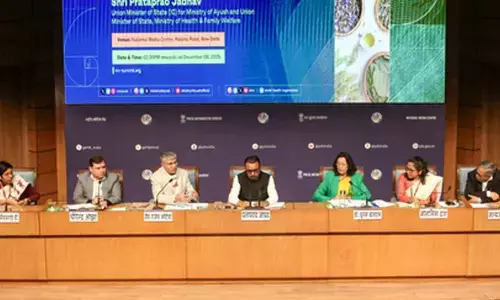Hyderabad: Study of diverse population, leads to better understanding of type-2 Diabetes

Study of diverse population, leads to better understanding of type-2 Diabetes
A worldwide study of diverse populations has shed new light on how genes contribute to type-2 Diabetes.
Hyderabad: A worldwide study of diverse populations has shed new light on how genes contribute to type-2 Diabetes. The study, DIAMANTE (Diabetes Meta-Analysis of Trans-Ethnic association studies) co-led by Prof. Andrew Morris at the University of Manchester, is published in Nature Genetics.
Dr Giriraj R Chandak, chief scientist at CSIR-Centre for Cellular and Molecular Biology (CSIR-CCMB) and one of the lead investigators from India, highlighted the study as a landmark event, where scientists from different parts of the world put together their minds to understand similarities and differences in genetic susceptibility to type-2 Diabetes in different populations.
A release by CCMB scientists said the global prevalence of type-2 Diabetes, a familial disease with severe morbidity, has increased four-fold over the last three decades. South Asia, especially India and China, are major hubs of this spurt. It is thought that Indians are specially at risk of type-2 Diabetes because they are centrally obese, meaning fat around the abdomen – indicative of fat around their visceral organs, and are more insulin-resistant right from birth. This is in contrast to the Europeans who are overall fat in a generalised manner. Despite this fact, the largest studies to understand genetic basis of type-2 Diabetes have mostly been conducted on populations of European ancestry.
This recent study compared genomic DNA of 1.8 lakh people with type-2 Diabetes against 11.6 lakh normal subjects from five ancestries –Europeans, East Asians, South Asians, Africans and Hispanics, and identified a large number of genetic differences (Single Nucleotide Polymorphisms or SNPs) between patients and the normal subjects. The study found population-specific differences in genetic susceptibility to type- 2 Diabetes.
The results pave the way for development of ancestry-specific genetic risk score for risk prediction in different populations and has immense implications for Indians, as every sixth individual is a potential diabetic," said Dr Chandak.
"This study sets up the stage for further investigating the South Asian population for genetic susceptibility to type-2 Diabetes and extend the journey on the path of precision medicine," said Dr. Vinay Nandicoori, Director, CCMB.














